Brazil election: Rousseff and Neves in tight contest
- Published
"It's all still to play for" - the BBC's Wyre Davies reports on a divisive campaign
Voting has ended in Brazil in one of the most bitterly-contested and tightest presidential elections.
Left-leaning President Dilma Rousseff faced centrist Aecio Neves of the Brazilian Social Democracy Party (PSDB) in the second round run-off.
Both candidates have fought to try to convince voters they can lift more Brazilians out of poverty and kick-start Latin America's largest economy.
On Saturday, opinion polls gave Ms Rousseff a slight lead over Mr Neves.
More than 140 million Brazilians voted across three time zones. Results are expected soon.
Correspondents say the middle class vote in Brazil's industrial southeast will be crucial.
Ms Rousseff voted early in the southern city of Porto Alegre, where she lived and developed her political career in the 1990s.
Mr Neves cast his ballot in the city of Belo Horizonte, where he served as governor of the southern swing-state of Minas Gerais for eight years.

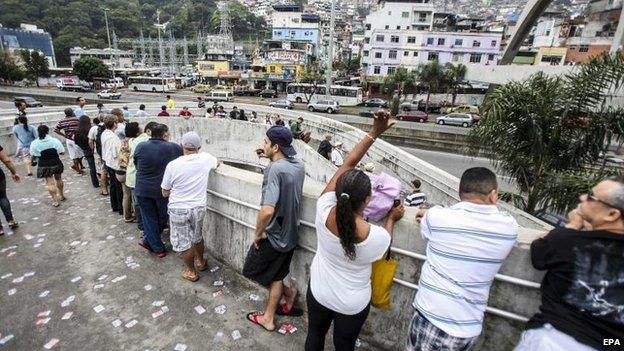
Voters queue in Rocinha, which saw brisk polling
At the scene: Wyre Davies, BBC News, Rio de Janeiro
In the sprawling Rio de Janeiro favela of Rocinha, support for the opposition presidential candidate, Aecio Neves, was thin on the ground this morning, but there's still plenty for voters to mull over.
This is a working class area where the incumbent, Dilma Rousseff, might be expected to do well, thanks to her government's welfare polices. But, as in the rest of Brazil, the standard of many public services is poor and Mr Neves's track record for good political management will attract many voters.
Voting here is brisk. Brazil is one of the world's biggest democracies and people seem genuinely engaged with the issues. The result is expected to be tight and there's an awful lot to play for, which is perhaps one reason why the campaign has, at times, seemed bitter and divisive.

Divided electorate
Poor Brazilians, particularly in the impoverished northeast, remain loyal to Ms Rousseff thanks to her party's trademark welfare programmes, such as the Bolsa Familia family grant scheme.
She enjoyed strong support there in the first round of the presidential election on 5 October, with almost 60% of votes.
But wealthy Brazilians, who are against interventionist economic policies such as petrol price controls and high taxes, favour instead business-friendly Mr Neves.
He is regarded in the financial markets as someone to put the economy back on track, after four years of low growth rates and the country now technically in recession, says BBC Brasil's Julia Carneiro.
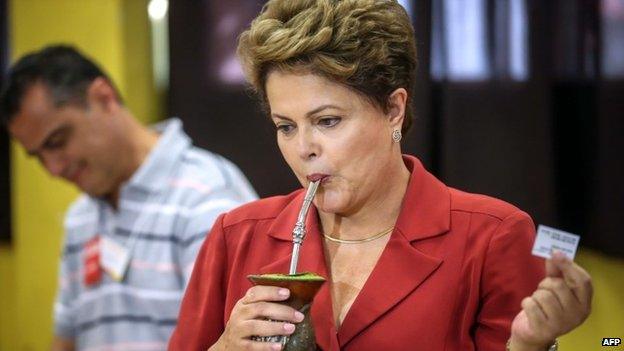
Incumbent Dilma Rousseff sipped a herbal tea after voting in Porto Alegre
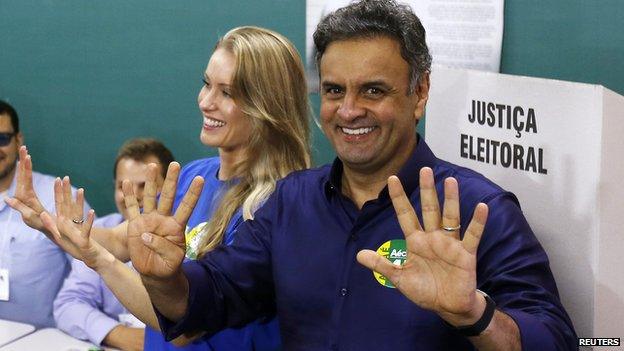
Challenger Aecio Neves voted in Belo Horizonte with his wife Leticia Weber
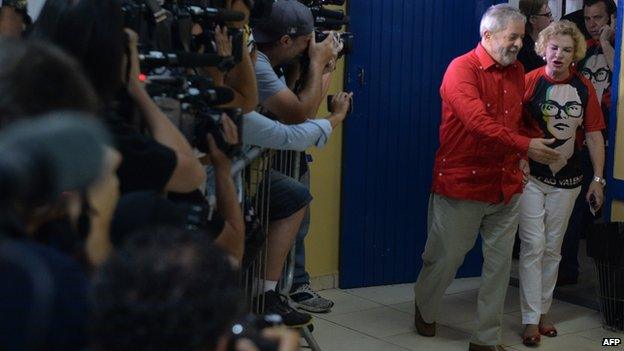
Former Brazilian President Luiz Inacio Lula da Silva, who backs Ms Rousseff, voted near Sao Paulo
Supporters of the government say that despite low growth, unemployment has reached historically low levels and wages have been rising.
The vote is widely seen as a referendum on 12 years of government by Ms Rousseff's Workers Party (PT).
The PT came to power in 2002 with Luiz Inacio Lula da Silva as president.
Its policies are credited with lifting an estimated 40 million Brazilians out of extreme poverty.
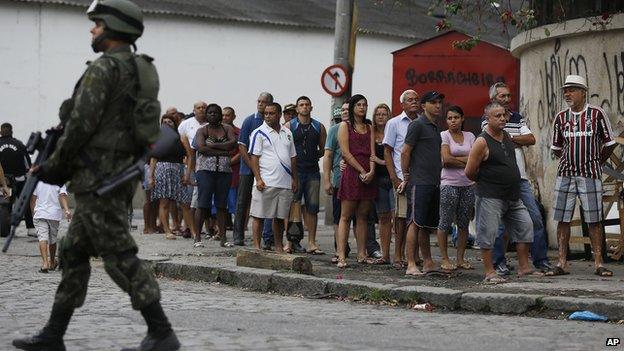
The vote is widely seen as a referendum on 12 years of government by the Workers Party
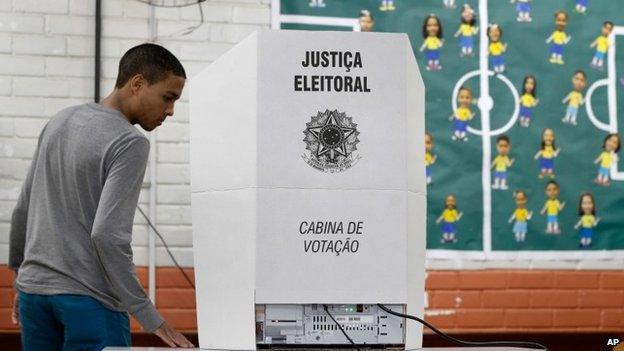
Some voting machines were set up in schools
But President Rousseff's government has faced allegations of corruption and of overspending in preparations for this year's football World Cup.
Dramatic race
The election came after weeks of intensive campaigning by the two candidates and a presidential race that took a tragic turn after Eduardo Campos, a main opposition candidate, was killed in a plane crash in August.
His running mate, a renowned environmentalist, Marina Silva, was thrust into his place, vowing to become the South American country's first "poor, black" president.
But she came third in the first round after Ms Rousseff and Mr Neves secured 41.5% and 33.5% of the vote respectively.
As neither candidate got an absolute majority, the election went into a second round.
Ms Silva has backed Mr Neves in Sunday's runoff vote.
States where candidates did best in first round

First Round Election Results By State
- Published13 October 2014
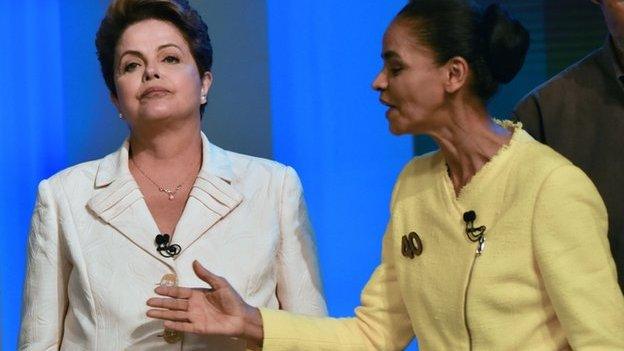
- Published6 October 2014

- Published6 October 2014
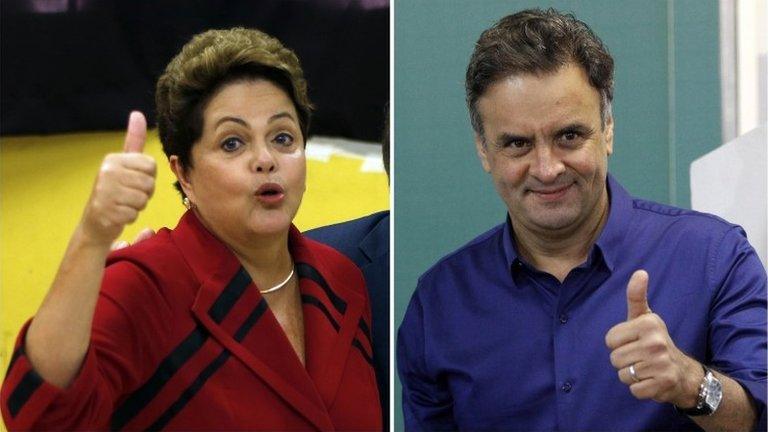
- Published26 October 2014
.jpg)